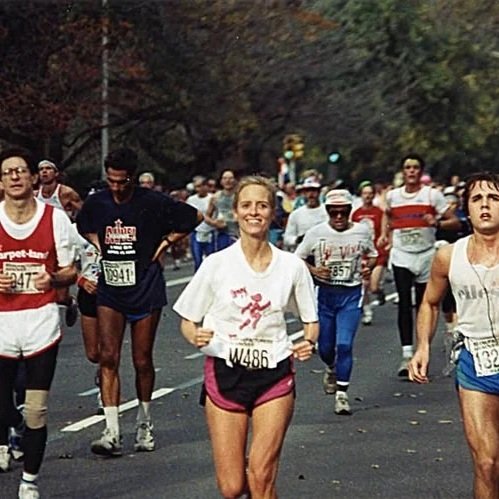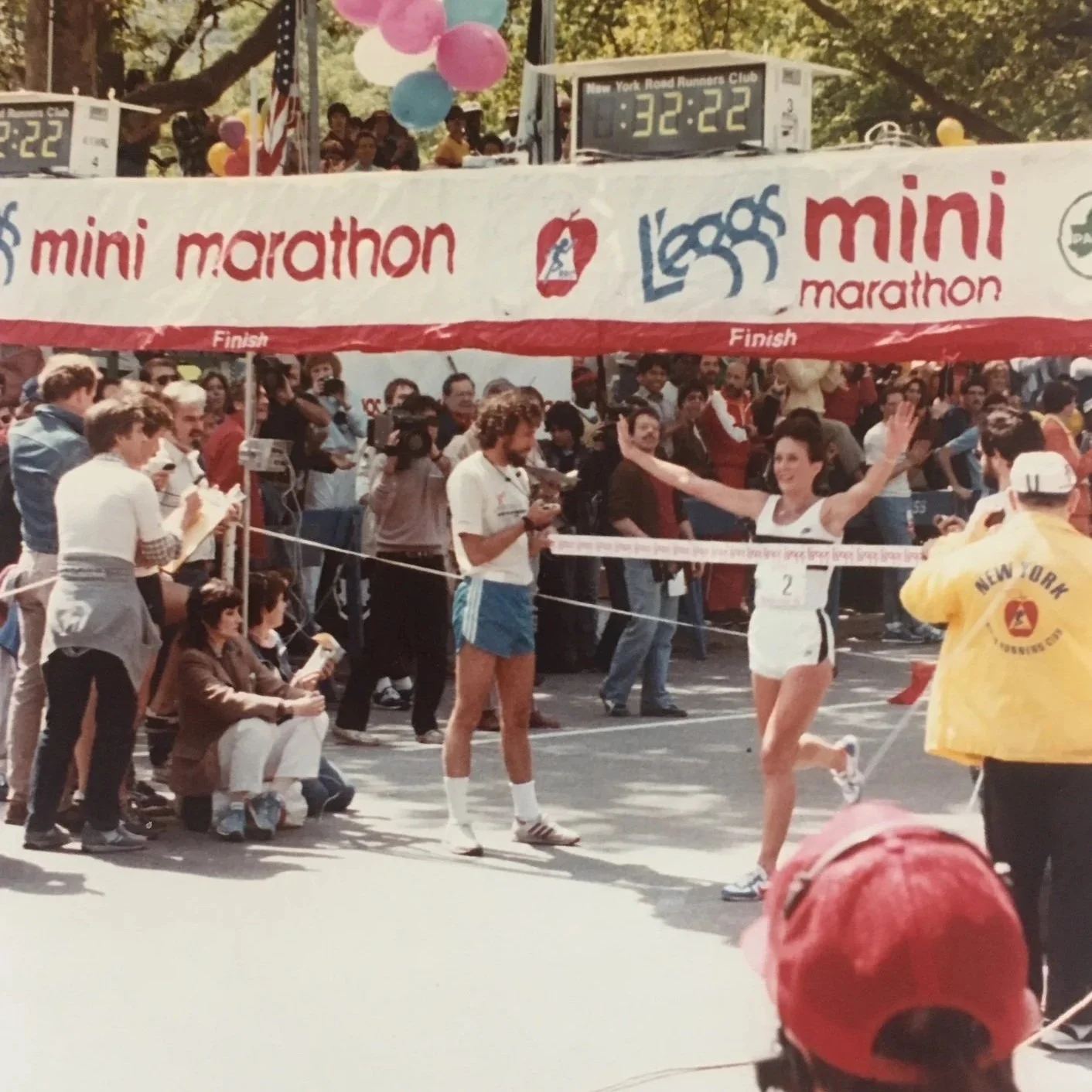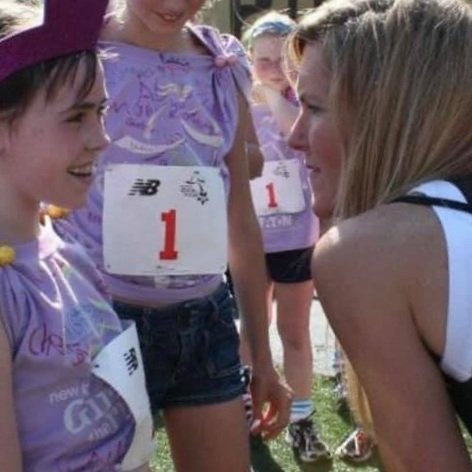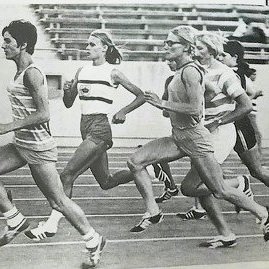Pioneer Stories

Tish Hamilton
If Tish Hamilton is being honest, she doesn’t consider herself a pioneer in women’s running. She looks at titans of the sport like Kathrine Switzer and activists like Alison Mariella Desir—“They’re legit,” Hamilton says. But Hamilton’s work in the sport—as the first female executive editor of Runner’s World magazine—is nothing to sneeze at. Hamilton calls the marriage of her two passions—running and journalism—a privilege. She helped usher in the second running boom, one driven largely by women, one step behind the helm of the go-to magazine for runners. The mission was to broaden the coverage of the sport—from elites to weekend warriors doing incredible work—and with that, bring in a more varied audience, including women.

Anne Audain
Anne Audain is a three-time Olympian and former professional runner for New Zealand. She had success as a very young athlete, qualifying for the 1972 Munich Olympics at age 16, though she wasn't able to compete until the 1976 Montreal Olympics, when she was 20. However, the road to discovering her talent wasn't without its challenges. Anne, who was adopted as a baby, was born with a bone deformity in both feet, which she wasn't able to correct with surgery until she was 13 years old. After more than a year of rehab and recovery, Anne hit the ground running, literally. Despite having competed in her first Olympic Games in 1976, she only went pro in 1981, and went on to have a storied career, breaking several course records on the US road running circuit and winning multiple Commonwealth Games medals. She retired from competition in 1990 and is now based in Evansville, Indiana.

Eileen Waters Connolly
Eileen Waters Connolly was a trailblazer in American long-distance running, part of the first generation of women to compete in the sport. In 1972, she made history by setting a world record in a 50-mile race on a track in Santa Monica, finishing in 7:05:31. Even more impressive, she ran negative splits—completing the second half 23 minutes faster than the first. A year later, she returned and broke her own record, cutting 10 minutes off her time. She died in 2016 at 71 from adenoid cystic carcinoma (ACC), a rare form of cancer. As she aged, she never lost her sense of humor or self-effacing nature. She was quoted as saying, “When you get
old, you just show up and most likely you'll win your age group.”

Deena Kastor
When you think about excellence in the marathon, the name Deena Kastor inevitably jumps to mind. After all, the 52-year-old held the American record in the distance for a whopping 19 years, setting it first in London in 2003, then bettering her own mark just three years later when she became the first American woman to run under 2:20. In fact, Kastor—a three-time Olympian, World Marathon Majors champ, World Cross Country medalist, and holder of national records from the 5K up to the 26.2—was drawn to distance from the very first time she hit the track.

Arlene Pieper Stine
Long before Roberta Gibb and Sara Mae Berman unofficially ran the Boston Marathon (1966 and 1969 respectively), Arlene Pieper Stine became the first woman to officially finish a sanctioned marathon in 1959, when she ran the Pikes Peak Marathon—ascent and descent—in 9:50:20 when she was 29. She was accompanied by twelve men and a horse. Pieper Stine ran in the men's category and was not given a special category or fanfare for her historic finish. She never ran another marathon and her pioneering accomplishment fell into obscurity until 2009.

Yolanda Holder
Upon turning 50 years old, Yolanda Holder decided to do something different for her birthday. While others in her circle of family and friends opted for elaborate parties, expensive experiences or trips, or even purchasing long-desired goods, Yolanda, on the other hand, set out to walk 50 marathons in 50 weeks. She didn't just meet that goal—she crushed it, completing 66 marathons in 52 weeks. And she never stopped. Now 67, Holder has become one of the most accomplished ultra-endurance athletes in the world. She has set Guinness World Records, all while breaking barriers as a race walker in a runner's world. Yolanda is also the first African American woman to achieve numerous milestones in multi-day racing.

Nina Kuscsik
Nina Kuscsik began running in the 1960s after discovering Bill Bowerman's Jogging while waiting for a bike tire repair. Born in Brooklyn in 1939, she was a natural athlete who became New York State champion in roller skating, ice speed skating, and bike racing in 1960. After taking a break to raise her three children, running reignited her competitive spirit. She unofficially ran the Boston Marathon in 1969 and 1970, then won it in 1972 when it first officially accepted women, finishing in 3:10:26. A pivotal moment came in 1970 when she was turned away from a two-mile race simply for being a woman—an experience that transformed her into a fierce advocate for women's running rights. At the 1972 New York City Marathon, she led a protest against the separate start rule for women, sitting at the starting line until the ban was lifted. During the 1970s, she likely ran more marathons than any other woman, completing over 80 marathons and winning 15. Her advocacy helped establish women's marathon running, and she witnessed Joan Benoit become the first Olympic women's marathon champion in 1984. As her son remembered, despite all her victories and advocacy work, Nina simply "ran for the pure pleasure of it" and loved "the freedom that running gave her."

Lena Hollmann
Lena Hollmann began her running journey in Sweden, her native country. She started with the 800 meters until 1969, when women were allowed to run the 1500 meters as well. She was part of the Swedish National Track Team and was a national champion in the 1500 meters. Lena moved to the United States with her husband in the late ’70s and at first, ran for fitness and fun. Then, she began training seriously again, entering races, and seeing success. In fact, she was the top woman at the Philadelphia Distance Run Half Marathon in 1979. Highlights of her running career include her 10th-place finish at the 1984 Boston Marathon and her 2:44:10 at the 1983 New York City Marathon. Lena’s elite running career ended when knee problems intervened. She changed focus and became a certified personal trainer and coach. This was the beginning of a new and rewarding journey for Lena. She focuses on women, specifically older women, and helps them achieve their fitness goals and develop a positive self-image. She's even considering a new role … model. “I want to show women that life isn't over because you’re in the mid-70s, and there are so many possibilities,” she says.

Molly Barker
Molly Barker began running with her mother when she was 14 years old, when her mother was newly sober. Years later, it was on a run in 1993 when Molly herself realized she needed to stop drinking or it would kill her. That run inspired her to create a program for young girls to accept who they are, with grace and pride, and celebrate themselves. She launched Girls onthe Run in 1996 at a site in North Carolina with 13 girls; it quickly grew and now has sites in all 50 states and in Canada. Molly left the organization in 2013 and now calls herself a "grandmother" to the organization (she also has two kids and one grandchild). In addition, she's written several books, including Girls on Track: A Parent's Guide to Inspiring Our
Daughters to Achieve a Lifetime of Self-Respect and Healthy Living, which helped bring the Girls on the Run program into the home.

Kathrine Switzer
Say the name Kathrine Switzer and many people aren’t sure who she is. Say, “the woman who
was accosted during the 1967 Boston Marathon because she was running in an event for men
only,” and it’s an image people recognize and remember. Kathrine had no idea what a historic run Boston would be; it became the spark for her life path. She went on to work at Avon and develop Avon Global Women’s Running, then advocated to have the women’s marathon included in the Olympics. She has also written books, commentated for major races, spoken to groups all over the world, and was the honorary starter for the women’s marathon at the Paris Olympics in 2024. Her number in the 1967 Boston Marathon, 261, became an inspiration for women and then the namesake of 261 Fearless, a non-profit Kathrine co-founded in 2015. She continues to open doors for women, encouraging them through running and helping them feel empowered, no matter their circumstances.

Marge Hickman
Marge Hickman can’t sit still. If she’s not running, she’s hiking, driving around the country in her RV, or engaging in another form of movement. Since she was a kid, the ultra running phenom has always felt an insatiable drive to prove herself. And that drive has taken her places few in the running community have dared to go. In 1989, Hickman completed the grand slam of ultra running, meaning she finished four of the oldest 100-mile races in a span of 10 weeks. She is one of only 59 women who have accomplished the feat since it was established in 1986. She also completed the Leadville Trail 100 a total of 14 times (within the time limit), the most by any woman at the event. Now, at almost 75 years old, Hickman still competes regularly as an enduring pioneer in the sport.

Jen Kanyugi
This month, we’re bringing you something a little bit different in this feed: an episode of Women’s Running Stories, a podcast hosted by Cherie Louise Turner. This episode features Jen Kanyugi, who last year ran her 20th consecutive Boston Marathon. And yes, after this was recorded, she did indeed finish the race! Jen's journey to get to this point is about this one event, and so much more. In this time, Jen went from not running more than 20 minutes on the treadmill to being a steady presence at this, one of the most recognized and celebrated running events in the world. She’s also learned the power of support, finding groups to train with and create community with, like Girls on the Run and Black Girls Run.

Henley Gabeau
In the mid-1970s, Henley Gabeau didn’t set out to become an accomplished distance runner. Instead, her athletic journey started as a simple desire to keep up with her 12-year-old daughter while training on the track. Henley quickly noticed there weren’t many spaces dedicated to women, so she and a group of like-minded athletes formed RunHERS, one of the first women’s running clubs in the United States. She went on to become the first female president of the Road Runners Club of America and then the organization's first-ever executive director; she also played a role in advocating for adding the women's marathon to the Olympics. Henley's contributions to the world of distance running go beyond her athletic achievements; her work as an advocate, race director, mother and leader helped shape women’s running into what it is today. Henley passed away in 2018—this interview was conducted by Olympian Amy Begley in 2013.

Dr. Joan Ullyot
Dr. Joan Ullyot, the “fastest physician marathon runner," paved the way for women runners across the world, proving by example that women should not be counted out when it comes to long distances. Ullyot raced in 80 marathons, winning ten of those along with the masters division in the Boston Marathon in 1984. Her book “Women’s Running,” published in 1976, and her in-depth studies as an exercise physiologist made the case that women deserve the equal opportunity to run competitively; her efforts were instrumental in lobbying the International Olympic Commission to add the women's marathon to the Olympics in 1984. Dr. Ullyot passed away in 2021, at age 80; this interview was conducted in 2013 by Amy Begley.
Read More

Sara Mae Berman
In 1969, 32-year-old Sara Mae Berman was the first woman to cross the finish line in the Boston Marathon. She did it again in 1970 and 1971. But women weren’t allowed to enter officially, so her times—3:22:46, 3:05:08, and 3:08:30, respectively—were unofficial. "All we ever wanted, us early women, was to be allowed to run the distance, and we weren't in any bloodthirsty competition with each other. We just wanted to be able to run the distance and improve our times," she says.

Native Women Run: Verna Volker,Jessica Louis, Amber Henderson, Angel Tadytin, and Birdie Wermy
Native people, including women, have been running over these lands since long before anyone organized a major marathon. Yet all too often, with notable exceptions like past guest Patti Catalano Dillon, they aren’t represented at modern races. Changing that is the key goal of Native Women Run, an organization that Verna Volker launched in 2018. At first, it was an Instagram page; now, it’s a non-profit that creates space for and elevates the stories of Native women who run. This year, NWR brought four runners to the Bank of America Chicago Marathon: Jessica Louis, Amber Henderson, Angel Tadytin, and Birdie Wermy. All of them joined Verna, Starting Line 1928’s Cindy Kuzma, and Cherie Louise Turner of Women’s Running Stories for a special live podcast recording at the expo the day before the race.

Junko Kazukawa
Junko Kazukawa is a Japanese born women's ultra running pioneer best known for having finished the Leadville 100-mile race 10 times. Junko is a two-time breast cancer survivor with more than three decades of experience in health, fitness and training. She currently works as an ultra endurance coach with Boundless.
Junko lives and trains in Denver, Colorado, and has completed 24 100-mile trail races so far, including Leadville, UTMB, Mt. Fuji, Ultra Fiord in Patagonia. She's the first female to finish the Grand Slam of ultra running in 2015. She was Lead Woman three times, in 2014, 2015 and 2024. This means she completed all six events in the Leadville Race Series in the span of two months in the nation’s highest city, including a trail marathon, a mountain-bike race, the Leadville Trail 100 Run, and more.
She was the 2015 Sports Woman of Colorado and voted as the Colorado resident badass in 2017.

Doris Brown Heritage
Doris Brown Heritage has always had a need to run. During a career that spanned roughly twenty years, Brown Heritage held every woman’s national and world record from the 440 yards to the marathon. In 1966 she became the first woman to run an indoor sub-five-minute mile in 4:52. Ten years later, on a lark with little training, she won her first marathon, the 1976 Vancouver International Marathon in 2:47:35 at the age of 34.
She is a two-time Olympian (1968, 800m, 1972 1500m) and is a living legend in her home state where she was named Seattle’s 1971 Man of the Year in Sports. She found that hilarious. Her most acclaimed accomplishment was winning five consecutive International World Cross-Country Championships from 1967 through 1971. “She is a remarkable woman who should have the name recognition of Jim Ryan,” claims Charlotte Lettis Richardson who included Brown Heritage in her documentary Run Like a Girl.

Laurel James
“Life is a challenge. And if you can’t enjoy that, you’re in trouble.” Laurel James, founder of the Seattle-based running retailer Super Jock ‘n Jill and mastermind behind the 1984 U.S. Women’s Olympic Marathon Trials race, does not mince words. James entered the nascent running-retail scene in 1975, and quickly cemented herself as a visionary female entrepreneur, race director, and community pillar in the running world and beyond.

Sue Parks
Sue Parks has had a storied career as an athlete and coach who continues to break barriers in the NCAA. Today, Sue is the director of cross-country and track and field at her alma mater, Eastern Michigan University. She’s one of the few women leading a track and field program at the Division 1 level. Years before she became a director, Parks was blazing her own path as one of the first women track stars in her home state. Her most memorable race was against Olympic gold medalist Madeline Manning (now Mims) in the Los Angeles Coliseum, where Parks ran her personal best in the 800 meters at the age of 16. She also competed on the U.S. team in the Pan American Games.

